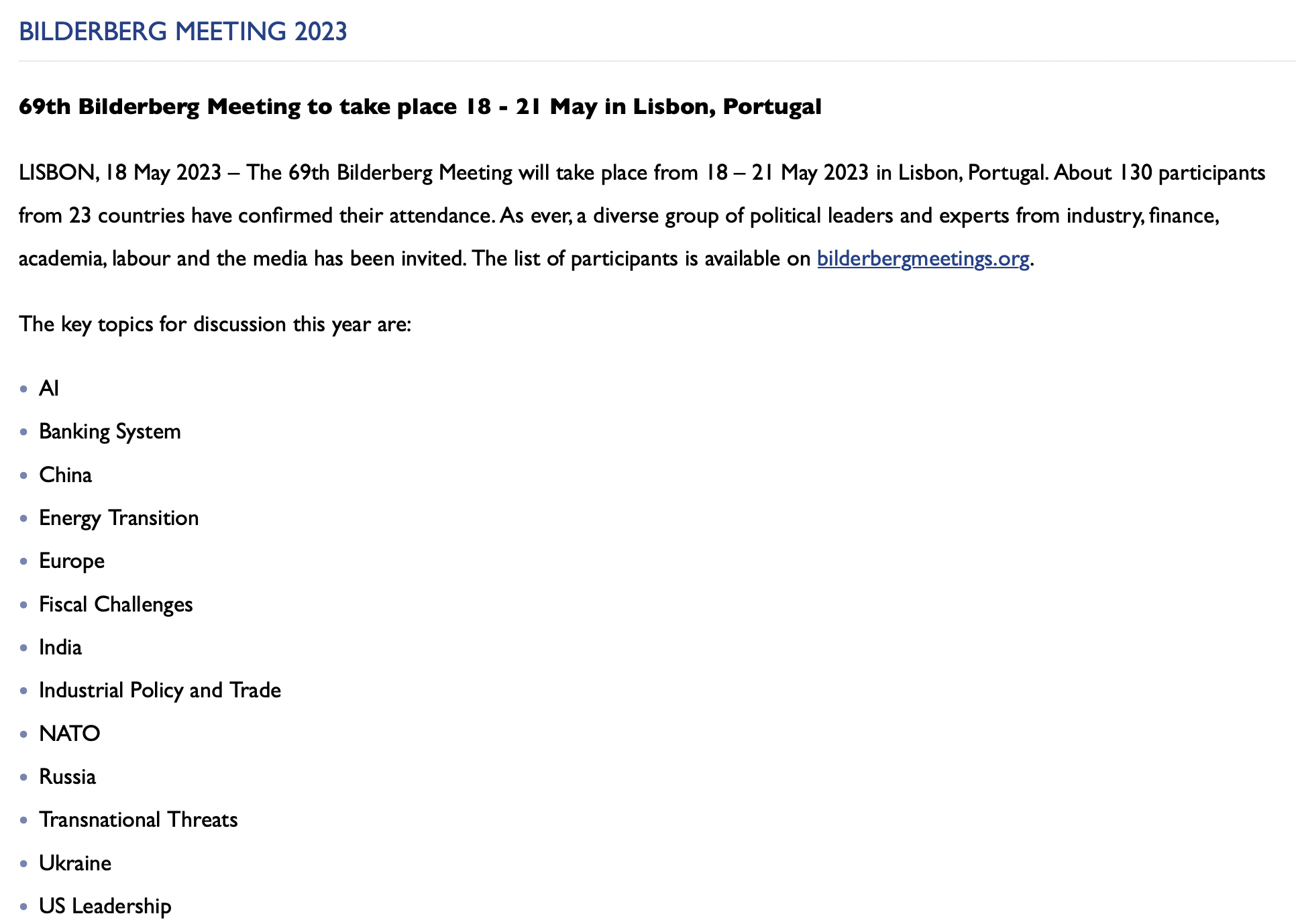Sam Altman’s OpenAI: Artificial Intelligence, The Bilderberg Group, and Worldcoin

All Global Research articles can be read in 51 languages by activating the Translate Website button below the author’s name.
To receive Global Research’s Daily Newsletter (selected articles), click here.
Click the share button above to email/forward this article to your friends and colleagues. Follow us on Instagram and Twitter and subscribe to our Telegram Channel. Feel free to repost and share widely Global Research articles.
***
OpenAI CEO Sam Altman recently testified in front of a U.S. Senate Judiciary subcommittee regarding the recent rise of Artificial Intelligence (A.I.) and the potential for disruption to numerous industries.
In addition to OpenAI’s ChatGPT experiencing a surge in popularity, A.I. generated art and even A.I. generated photography winning prizes make it clear that the age of A.I. disruption has begun. The so-called Godfather of A.I. recently quit Google because he wanted to speak openly about the dangers posed by A.I. generated deep fakes.
In his prepared statements, Altman told the senators “the regulation of A.I. is essential.” Altman also called for what he termed “appropriate safety requirements, including internal and external testing prior to release”. He also expressed support for licensing and registration of certain A.I. systems.
Altman stopped short of calling for complete government regulation, instead stating that governance schemes must be “flexible enough to adapt to new technological developments” while balancing “incentivizing safety while ensuring that people are able to access the technology’s benefits.”
Fortune writes that “Altman’s advocacy for some rules is not surprising. Technology companies know that regulation is likely coming, and they are trying their best to shape it to their advantage”.
The argument is that Altman and other CEO’s of A.I. companies may decide licensing allows them to protect the code to their proprietary models. Also, Big A.I. may fear the rise of open source A.I. models and thus call for licensing schemes which place extra burdens on creators of open source software.
Fortune continues:
“Among the biggest competitive threats these companies face is open source A.I. software. In this rapidly moving field, no one is moving faster than the open source community. It has proved remarkably innovative and agile at matching the performance and capabilities of the proprietary models, but doing so with A.I. models that are much smaller, easier and less expensive to train, and which can be downloaded for free.”
Regardless of the reason, Altman has joined the growing chorus of A.I. advocates who are calling for regulation or licensing of A.I. The CEO’s concerns have also led to politicians and policymakers warning about the dangers of not regulating the technology. CNBC reported that during the Senate hearing on A.I. Senator Josh Hawley compared the emerging technology to the creation of the printing press and the nuclear bomb. Hawley stated that this may lead humanity to two potential futures: one which A.I. empowers humanity, or one with a “huge technological breakthrough” but “severe, terrible” consequences.
The Bilderberg Group in Portugal
Only days after testifying in front of the U.S. Senate, Sam Altman participated in the secretive Bilderberg Group meeting in Lisbon, Portugal. In the weeks and days leading up to the meeting there was not a single report from the mainstream corporate press, with only a handful of independent journalists reporting on the meeting, including Dan Dicks of Press for Truth.
Altman was joined by fellow A.I. proponents and CEO’s, including Microsoft’s Satya Nadella, Deepmind’s Demis Hassabis, and former Google CEO and current chair of the Bilderberg Group Eric Schmidt.
As The Last American Vagabond reported in February 2021, the Biden Administration assigned Schmidt to head the National Security Commission on Artificial Intelligence (NSCAI), or the A.I. Commission.
According to a December 2022 report from Politico, Schmidt was funding the salaries of more than 2 dozens employees in the Biden administration. Since at least March 2022 Politico has outlined how Schmidt’s fingerprints were all over the Biden administration. Schmidt’s role as the former CEO of Google, a member of the Bilderberg Group, his role in the Biden admin, and his relationship with former U.S. Secretary of State Henry Kissinger are more than enough reasons to be concerned with the direction the A.I. conversation is headed.
In fact, Kissinger, a long-time adviser to U.S. Presidents, was also present at the Bilderberg group. Kissinger has been attending the Bilderberg meeting off and on since its founding in 1957. Kissinger has said that his interest in A.I. came after Schmidt persuaded him to attend a lecture on the topic while at the Bilderberg conference in 2016. The two men also co-authored a book in 2021 titled The Age of AI: And Our Human Future.
Sam Altman and fellow A.I. CEO’s were also joined by NATO Secretary-General Jens Stoltenberg, Ukrainian Foreign Minister Dmytro Kuleba, Pfizer CEO Albert Bourla, BP chief Bernard Looney, Børge Brende, the President of the World Economic Forum, and co-founder of PayPal and Palantir Peter Thiel. Thiel has come under attack in recent days because of his relationship with Jeffrey Epstein.
Due to the lack of transparency surrounding the Bilderberg Group, details surrounding Altman’s involvement in the meeting have not been made public. However, based on the history of the Bilderberg Group shaping important world events, and even likely granting their approval of future political leaders, one can surmise that Altman’s attendance will bode well for his career and the continued rise of OpenAI.
While Sam Altman’s attendance at Bilderberg in Portugal may have something to do with his role at OpenAI, it’s also highly likely that his latest tech project is an even more relevant reason for his appearance.
Worldcoin
Sam Altman and fellow technocrat Elon Musk have a history of collaboration at OpenAI, as well as warning about the potential dangers related to the rapid rise in use of the technology. However, despite warnings, both men continue to fund projects which have the potential to contribute to the rise of the Technocratic State, with A.I. powering biometric digital identities, digital currencies, and the Internet of Things/Bodies.
For example, one day before Altman testified to Congress, the Financial Times reported that Altman was “close to securing around $100mn in funding for his plan to use iris-scanning technology to create a secure global cryptocurrency called Worldcoin”. The Times said three people with knowledge of the deal claimed the team behind Worldcoin is in “advanced talks” to raise the funds in the “next few weeks”.
The source told the Times that the funding is coming from existing and new investors. Previously reported investors in the project includes FTX founder Sam Bankman-Fried and internet entrepreneur Reid Hoffman.
Altman has promoted the project as a way to prepare for the disruption A.I. is anticipated to cause to a number of industries. Worldcoin executives has stated that their work is focused on helping distinguish between humans and bots by providing a unique ID and providing a universal basic income to offset job losses caused by A.I.
Altman and team have called Worldcoin an “inclusive” global cryptocurrency that will be available to anyone who verifies their “unique personhood” with the “Orb,” a device that scans an individuals unique iris pattern.
“The Orb checks that an individual is real and is unique or has not previously signed up for Worldcoin. It does this by capturing and processing images of an individual and their unique iris pattern,” Worldcoin explains on its website.
Once a user submits to biometric iris scans they are assigned a “World ID” that allows them to receive 25 free Worldcoin tokens at launch of the token. The company claims once the unique identity is created the iris scans are deleted.
While the project is being touted as a method of softening the blow of A.I. disruption, it’s clear such a project also mimics calls for digital identity using biometrics being proposed by the United Nations, the World Economic Forum, and a growing number of international governments. Perhaps, Altman and his cohorts believe the technology will be used for good in their hands, but the relationship to the Bilderberg Group, Silicon Valley, and Elon Musk are — at the very least — a cause for concern and reflection.
One way or another, it appears a world built around digital identities and digital currencies is indeed rapidly approaching. Will it be identities controlled by governments and corporations? Or will open source, decentralized, and distributed versions of technologies like A.I. rise to the top?
*
Note to readers: Please click the share button above. Follow us on Instagram and Twitter and subscribe to our Telegram Channel. Feel free to repost and share widely Global Research articles.
Derrick Broze, a staff writer for The Last American Vagabond, is a journalist, author, public speaker, and activist. He is the co-host of Free Thinker Radio on 90.1 Houston, as well as the founder of The Conscious Resistance Network & The Houston Free Thinkers. https://www.thelastamericanvagabond.com/category/derrick-broze/


